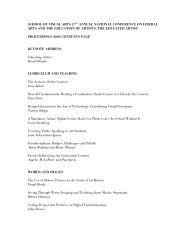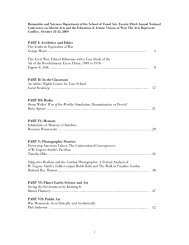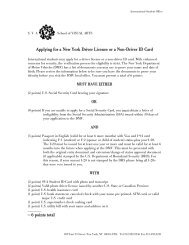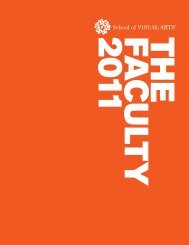SECTION 1 - via - School of Visual Arts
SECTION 1 - via - School of Visual Arts
SECTION 1 - via - School of Visual Arts
Create successful ePaper yourself
Turn your PDF publications into a flip-book with our unique Google optimized e-Paper software.
seen examples <strong>of</strong> these tactics bandied about in front page headlines blatantly proclaiming<br />
tabloid horror stories such as—”Recent SAT scores show American students lagging behind the<br />
Japanese, the Germans, the Koreans, the Canadians, and possibly some species <strong>of</strong> elk”. The<br />
theme <strong>of</strong> these “scare tactics” is basically that someone (the Japanese, Germans, Koreans, etc.)<br />
is getting ahead <strong>of</strong> America in some measurable way. Curiously, that measurable way almost<br />
always seems to pertain to business and economics rather than education. For example, after a<br />
recent set <strong>of</strong> SAT scores were released, alarmed business leaders claimed that the low scores<br />
carried the broad implication that schools were not even preparing students for the assembly<br />
line much less “respectable” corporate jobs (Business adjust, 1991). Foster Smith, a senior Vice<br />
President <strong>of</strong> the National Alliance for Business stated that, “in some cases businesses have had<br />
to ‘dumb down’ the work—spend time and money on machines and work processes that fit an<br />
undereducated work place”. (Business adjust, 1991, p. 7-A).<br />
These tactics have not changed much for literally decades. In 1983, the federal government’s<br />
National Commission on Excellence in Education issued the report known as “A Nation At<br />
Risk.” In language designed to frighten the reader into more money for a plan-less,<br />
meaningless public education policy, the commission warned, “if an unfriendly foreign power<br />
had attempted to impose on America the mediocre education that exists today, we might well<br />
have viewed it as an act <strong>of</strong> war” (Spring, 1991, p. 24). This pseudo-intellectual saber rattling is<br />
a thinly disguised attempt to develop a plan for the sole purpose <strong>of</strong> economic and market gain<br />
and yet pass it <strong>of</strong>f as a “plan for education”. This is made clear when the same report declared<br />
that, “if only to keep and improve on the slim competitive edge we still retain in world markets,<br />
we must rededicate ourselves to the reform <strong>of</strong> the educational system for the benefit <strong>of</strong> all”<br />
(Spring, 1991, p.24).<br />
All this is perhaps a political plan. Perhaps it is an economic plan. But it is not an educational<br />
plan. When considered as an educational plan such ideas are worse than no plan at all and<br />
bring us closer to the abyss <strong>of</strong> the uncivilized existential vacuum. Such a plan is the plan <strong>of</strong> the<br />
“sound bite” and the “slogan.” It is the plan <strong>of</strong> meaningless platitudes designed to minimally<br />
satisfy the taxpayer until the next bond issue, or next mill levy, or next Goals 2000 is passed. It<br />
is a plan that totally ignores the fine arts and humanities, and one that dulls the mind and<br />
withers the soul <strong>of</strong> education. It is the plan to build bigger, richer, and emptier basilicas.<br />
If a person or an institution remains in a plan-less state for any length <strong>of</strong> time it degenerates<br />
into a sense <strong>of</strong> fatalism. This is Frankl’s second step downward into an existential vacuum.<br />
Fatalism is simply the belief that though conditions are unacceptable, there is nothing that can<br />
be done to change them. It is the belief that our destiny is out <strong>of</strong> our hands. The symptoms <strong>of</strong><br />
this stage <strong>of</strong> the vacuum are the “exaggerated sigh” and the reliance on a nebulous, sinister,<br />
and virtually omnipotent outside agent to relieve us <strong>of</strong> personal responsibility. Examples <strong>of</strong> this<br />
abound. The teacher says (with an elongated, and heartfelt sigh <strong>of</strong> course) that he/she could do<br />
better with more support from the parents and the local administration. The local<br />
administration (not to belabor the point, but it must be remembered that all <strong>of</strong> the following<br />
statements are accompanied by the ritual obligatory sigh) says that he/she could do better<br />
without all the federal regulations and bureaucratic nonsense. The pr<strong>of</strong>essor <strong>of</strong> education says<br />
that he/she could do better with more higher education funding, with more support from the<br />
Dean, with less interference from the board <strong>of</strong> regents or the state legislature, ad infinitum. At<br />
every level the litany continues. We sigh and admit we are impotent because <strong>of</strong> “them”<br />
12








